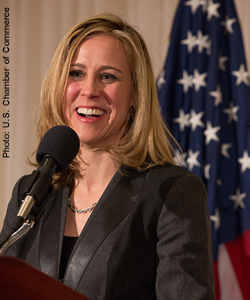Cargill helps launch drive to end Cuban embargo
In Washington DC, a kickoff event was held for the U.S. Agricultural Coalition for Cuba, a new group that wants to normalize trade relations with the island state.
January 09, 2015
The USACC is comprised of more than 30 American agricultural trade organizations and companies. The coalition wants to open Cuba up further as a market for U.S. agriculture exports. Its ultimate goal is to see relations between both countries fully normalized and put an end to the more than five decades old embargo.
“The sanctions are harmful to the citizens of Cuba and harmful to our industry,” said Cargill vice-president of Corporate Affairs and USACC chairperson Devry Boughner Vorwerk at the coalition’s formal launch at the National Press Club. “We would like to offer high quality, affordable, safe food to the Cuban citizens. Fifty-four years of unilateral sanctions is an experiment that has gone on too long. It is a failed policy and it’s time to offer our two countries a better option.”
Lifting trade restrictions
On December 17, President Barack Obama announced that the U.S. would revise its stance towards Cuba. Cargill, a longtime opponent of the embargo, applauded that move.
Although a full end to the embargo requires an act of Congress, the president is expected to lift more and more trade restrictions, including strict financial rules that make it difficult for American agriculture to do business in Cuba.
 Devry boughner Vorwerk, Cargill vice-president and USACC chairperson
Under current sanctions, U.S. food and agriculture companies can legally export to Cuba, but the financial restrictions limit their ability to do so competitively. Increasingly, foreign competitors such as Canada, Brazil, and Argentina are edging out their American counterparts, because they do not face the same restrictions.
Devry boughner Vorwerk, Cargill vice-president and USACC chairperson
Under current sanctions, U.S. food and agriculture companies can legally export to Cuba, but the financial restrictions limit their ability to do so competitively. Increasingly, foreign competitors such as Canada, Brazil, and Argentina are edging out their American counterparts, because they do not face the same restrictions.
“Changes to U.S. policy toward Cuba can support economic growth and well-being in both countries,” argued Boughner Vorwerk. “Trade liberalization is a tried and true policy that creates opportunities for citizens on both sides. Open markets work to energize the economy, allow for development of entrepreneurs, empower small and medium sized business, raise incomes, and lead to a higher standard of living. It is a choice between freedom or not.”
1.7 billion dollar market
At the USACC launch, U.S. Secretary of Agriculture Tom Vilsack noted that American agriculture has had a good year in 2014, but said that an opening with Cuba would allow the sector to do even better. He said the embargo “isolated us from the rest of the hemisphere, and isolated ordinary Cubans from the outside world.”
“These policy changes will make our products much more price competitive and they’ll expand choices for Cubans shopping in Cuban grocery stores,” said Vilsack. “Cuba imports about 80 percent of its food, which means that there is significant economic potential for our producers. It’s a 1.7 billion dollar market.”
View from the Heartland
Missouri’s Republican governor Jay Nixon offered the perspective from the Heartland. He called the opening up of Cuba “a tremendous opportunity to strengthen our farms and our economy.”
Missouri is among the top ten states exporting corn, soybeans, cotton, cattle, chickens, hogs and turkey, said Nixon. In recent years, it has inked more than $10 billion in agreements for additional agricultural exports to places like China, Brazil, Taiwan, Korea and Europe. A significant portion of those agreements are not with the central governments in those countries, but with states and provinces.
“Our counterparts at the sub-national level on that side are just as excited about these opportunities as we are,” said Nixon. “It is the place where a significant amount of trade gets done, and no sector is stronger than the agricultural sector. The more Missouri goods we sell overseas, the more good jobs we create back at home—it’s really pretty simple. But right now, when it comes to Cuba, we are not on a level playing field, because of the sanctions.”
Legislative hurdles to cross
President Obama has done what he can to lower hurdles for the export of agricultural goods to Cuba, said Tom Vilsack. According to him, food producers have taken advantage of the fact that theirs were among the only U.S. products that could legally be exported to Cuba. But to gain back the competitive edge American companies lost to their overseas competitors, “there are still legislative hurdles to cross.”
Increased trade should produce “positive change” in Cuba Said Vilsack. “That’s where American farmers and ranchers come into play. Throughout history, it has been agriculture that has served as a bridge to foster cooperation, understanding and an exchange of ideas among people. I have no doubt that agriculture will play an important role in years to come as we expand our relations with the Cuban people.”
